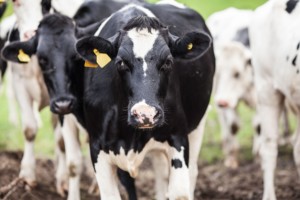Canola Meal and Protein
Animal Feed
 Canola meal is one of the most widely used protein sources in animal feed for livestock, poultry and fish. It has an excellent amino acid profile, including high levels of methionine, lysine and arginine, plus it is rich in vitamins and essential minerals. Thanks to low levels of glucosinolates — bitter-tasting compounds characteristic of rapeseed — canola meal is palatable to animals.
Canola meal is one of the most widely used protein sources in animal feed for livestock, poultry and fish. It has an excellent amino acid profile, including high levels of methionine, lysine and arginine, plus it is rich in vitamins and essential minerals. Thanks to low levels of glucosinolates — bitter-tasting compounds characteristic of rapeseed — canola meal is palatable to animals.
Studies have shown that including canola meal in dairy cow rations can increase milk production by one liter per cow per day. Canola meal also provides a sustainable alternative to traditional fish feed in aquaculture and it can be used in all stages of production for swine and poultry.
To learn more about canola meal in livestock feed, visit Canolamazing.com by the Canola Council of Canada.
Human Food
 While traditionally used in just animal feed, canola meal can offer nutritional benefits to humans, too. A process has been patented to derive canola protein from meal with excellent nutritional and functional characteristics for food products. Since canola protein is well balanced in essential amino acids, its use in food and as a supplement has great potential.
While traditionally used in just animal feed, canola meal can offer nutritional benefits to humans, too. A process has been patented to derive canola protein from meal with excellent nutritional and functional characteristics for food products. Since canola protein is well balanced in essential amino acids, its use in food and as a supplement has great potential.
Canola protein isolates received Generally Recognized as Safe status from the U.S. Food and Drug Administration for their use in human foods in 2010, 2011, 2016 and 2017. These proteins have tremendous functionality in food and beverage applications. While ingredients like milk, soy and eggs have useful proteins, they do not remain functional in certain foods and drinks the way canola proteins do.
Canola protein in general has excellent functional properties, high nutritional value and balanced taste, making it suitable for a range of applications including meat and dairy alternatives, beverages, bars, and baked and ready-to-mix products. They are especially useful for vegan and vegetarian markets.
One type of canola protein is highly soluble for use in highly acidic beverages like sodas, sports drinks and fruit juices as well as confectionery, aerated desserts and protein bars. Soy, milk and other proteins dissipate in acidic beverages, but canola protein maintains its characteristics in such products. Another type of canola protein is ideal as an emulsifier for gelling and binding various food products. It can substitute for ingredients like eggs and milk in baked goods, dressings, sauces and meat substitutes.